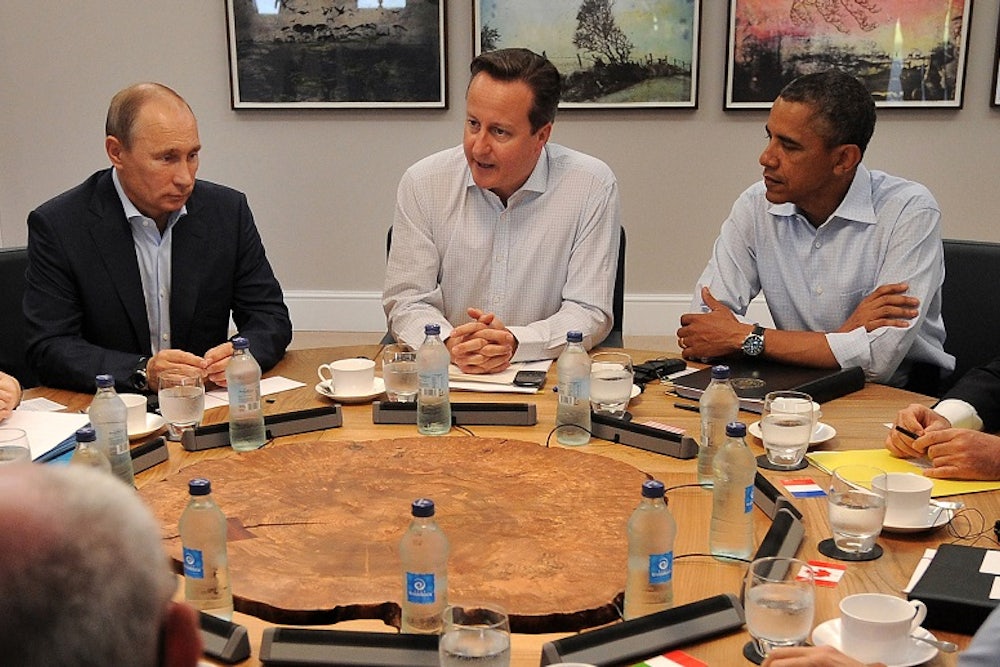As the crisis in Ukraine continues to escalate, the United States and European Union have attempted to increase the pressure on Russia to defuse the situation. The G7 countries all have pulled out of preparatory talks for the G8 summit in Sochi, Russia this summer and the Pentagon called off all joint military exercises with Moscow. One response that has been floated constantly this week is economic sanctions. In fact, President Barack Obama signed an executive order on Thursday that allows the U.S. to impose sanctions against certain Ukrainian and Russian individuals who have undermined Ukrainian sovereignty, particularly in Crimea. The E.U. met in an emegency meeting today and cut off talks with Russia on a wide-ranging economic pact. They are also threatneing further sanctions if Russia does not back down. But what does that actually mean? How do economic sanctions work and how could they hurt Russia?
Let’s break it down:
What did Obama’s EO actually do today? Who is hurt by it?
The EO imposed a visa ban against certain Russian and Ukrainian officials, which prevents them from entering the United States. The administration does not release a list of names of those sanctioned so we don’t know who they are. In fact, they won’t even know they face a visa ban until they try to enter the U.S. or unless are already here and have their visa revoked. The order also authorizes the Treasury Department to impose additional economic sanctions against “individuals and entities.” Those sanctions could come in the form of freezing the assets or stopping Americans from doing any business with them. These individual sanctions require more advanced planning, because the charges must hold up in court. For that reason, Obama has only given Treasury the authority to take such moves.
Did we sanction Russian President Vladimir Putin?
We don’t know, but that’s highly unlikely. The U.S. rarely issues visa bans or freezes the assets of other heads of states, unless we are trying to depose them.
OK. If we aren’t going after Putin, how will this help de-escalate the crisis? Putin’s in charge, after all.
It won’t do much, but the sanctions are targeted at those most involved in the situation in Crimea. If Treasury does take the next step and freezes the assets of certain individuals, it could limit their resources. It could also apply to some powerful people within the Russian government. But this is a first step. A stronger action would be to impose sanctions against the entire country of Russia.
Oh, that sounds like a more powerful tool. How would it work?
There are many different kinds of sanctions we could impose against Russia. We could revoke their favorable tariff rates, which would increase the taxes Russian firms have to pay to sell their goods in the United States, or impose quotas so that those companies can only sell a certain amount of their goods here. We could also implement a trade embargo. That embargo could cover certain goods, certain state-run organizations, or be a blanket policy that would prohibit U.S. individuals and companies from doing any business with Russia. Right now, the U.S. has a trade embargo against Cuba that covers consumer goods, money and arms. With North Korea, the U.S. embargo covers only luxury goods and arms, with the goal to inflict pain on North Korea’s leaders, not its citizens. We could also prevent Russians from accessing U.S. financial markets, denying them a liquid source of funds.
Would any of that work?
Probably not. The United States did less than $40 billion of trade with Russia last year. If the U.S. stopped purchasing oil from Rosneft, Russia’s state-run oil giant, it would cost the Russian government some revenue, but very little of Russian's oil exports actually go to the U.S. If Putin is set on moving into East Ukraine, it’s unlikely that any form of U.S. economic sanctions will deter him.
Wait, wouldn’t some of these sanctions hurt the U.S. as well? Don’t American companies do business in Russia?
Correct. Exxon, Coke, Pepsi and others would all be hurt by any economic sanctions that limit their ability to access the Russian market. In addition, Russia could retaliate with sanctions of their own. They are reportedly preparing their own visa bans on U.S. officials in retaliation for Obama’s executive order.
How does the E.U. fit into all of this?
The E.U. can impose its own sanctions against Russian individuals and entities. They will carry much more force than anything the U.S. does, because the E.U. does more than $400 billion of trade with Russia each year. This is a double-edged sword though. For instance, if the E.U. prohibits Eurozone businesses from purchasing Russian natural gas and oil, it would significantly impact the Kremlin’s finances. But it would also leave the Eurozone nations without a vital energy supply, increasing the price of gas and oil and potentially leading to shortages. That's made countries like Germany hesitant to support sanctions.
